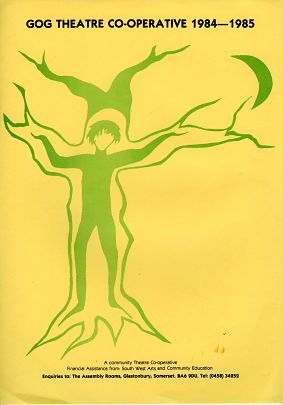Gog Theatre Company Archive
Overview
Gog Theatre Company was initially formed out of a three month theatre training and performance youth opportunities programme, sponsored by a Manpower Services scheme in 1981.
The name, Gog, was suggested by a member of the theatre group, and comes from the two 1000 year old trees at the foot of the Glastonbury Tor called Gog and Magog. It is believed that in the Druids’ time these trees were the beginning of a sacred tree avenue that let up to the Tor. The tree is also the logo of the Gog Theatre.
Originally based at Crispin Hall in Street, Somerset in the beginning, the theatre company then moved to The Assembly Rooms in Glastonbury, a semi-derelict Victorian community centre which became their venue and base to work from.
Gog Theatre Company undertook work with primary and secondary schools, colleges, youth and community centres by way of performance tours, workshop programmes in theatre, dance, video and circus, alongside a commitment to multi-cultural education within the country.
The company were well known for their annually devised children’s plays. These incorporated live and original music, song, movement and visual affects to present educationally informative material in an appealing and entertaining style, with maximum involvement from the children. As well as touring schools, Gog also devised and performed plays aimed at adult audiences and toured them to various venues, including the Edinburgh Festival.
In November 1985 Gog travelled to Cameroon, West Africa for a three month performance and workshop tour. From this visit evolved two productions, “A Comin’ Home” and “Into Africa”.
In September 1989, Gog travelled to Tbilisi, Georgia USSR for the first part of a unique cultural exchange project with the Rustaveli Young Company. Gog premiered a new play called “Birdman” based on the story of Bladud, an ancient King of Britain, who wanted to fly. In May 1990 Gog Theatre hosted the Rustaveli Young Company in a return visit to the UK, with a national tour of “The Stepmother”.
The company disbanded in 1994 and was officially dissolved in 2007.
What the collection holds
The archive contains information relating to the work of Gog from its inception to its close, including business and financial files, production information, education work and oversees tours. Please note some information may be closed due to the Data Protection Act.
The online catalogue for this collection can be viewed here:
GOG - Gog Theatre Company Archive
